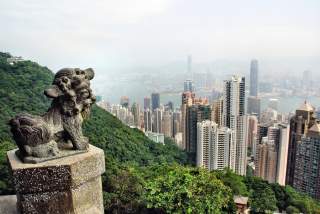China's Bullying of Hong Kong Could Get Ugly
A political squeeze is clearly underway in Hong Kong—a city whose citizens value their civic rights.
It’s not that China wants to turn Hong Kong into “just another Chinese city,” as critics sometimes allege. Even though Hong Kong years ago stopped being an essential contributor to mainland growth, it remains economically important in many ways. With a convertible currency, it offers connections to the international financial system that Shanghai cannot match, and is a useful place for influential mainlanders to deposit or transit their wealth—legally or otherwise. The bulk of its $700 billion-plus annual trade is with the mainland. Millions of Chinese tourists visit annually for such attractions as Disney World, Ocean Park or high-value shopping. Beijing hopes the city will help finance its expansive new One Belt, One Road initiative to develop central Asia as a gateway to Europe. Many young mainlanders study in Hong Kong and find good jobs. Yet local graduates often complain this comes at their expense and leaves them underemployed at best; that resentment fed the Occupy Central protests.
Though Hong Kong’s per capita income roughly matches American levels, and unemployment is only 3.2 percent, those numbers mask serious social problems. The once-booming growth rate has slowed to 3 percent. The city’s income gap is acute, the most extreme since record-keeping began forty-six years ago. It has, by some measures, the world’s highest housing costs, meaning those with average incomes may never have a place of their own. (One reason is that rich mainlanders and local tycoons often buy multiple new apartments for speculation, keeping them empty until prices rise. President Xi’s sister has owned a costly home in Repulse Bay.) Living conditions for the elderly poor, a rising portion of the total population, can be abysmal.
President Xi has told new Chief Executive Lam to forget politics and instead tackle these issues. At their recent Beijing meeting, he said “some long-standing conflicts and problems have been gradually exposed.” He said she must face those “challenges and risks . . . you have a great responsibility.”
For all that, Hong Kong in many ways remains an open city. Unlike in China, the Internet is not censored and the press is relatively free (though some publishers enforce self-censorship for commercial reasons). There are free elections for half the seventy legislative seats, with the others chosen by interest groups. It’s the only place in China where an annual June 4 demonstration can protest the 1989 Tiananmen massacre, though this year’s turnout was the smallest yet. For the most part, the rule of law prevails. But a political squeeze is clearly underway in a city whose citizens value their civic rights. If it becomes a serious crackdown, the coming years will bring mass protests in Hong Kong and an unpredictable degree of social turmoil.
Robert Keatley is a former editor of The Asian Wall Street Journal and the South China Morning Post, both of Hong Kong.
Image: Overlooking Hong Kong. Pixabay/Public domain

